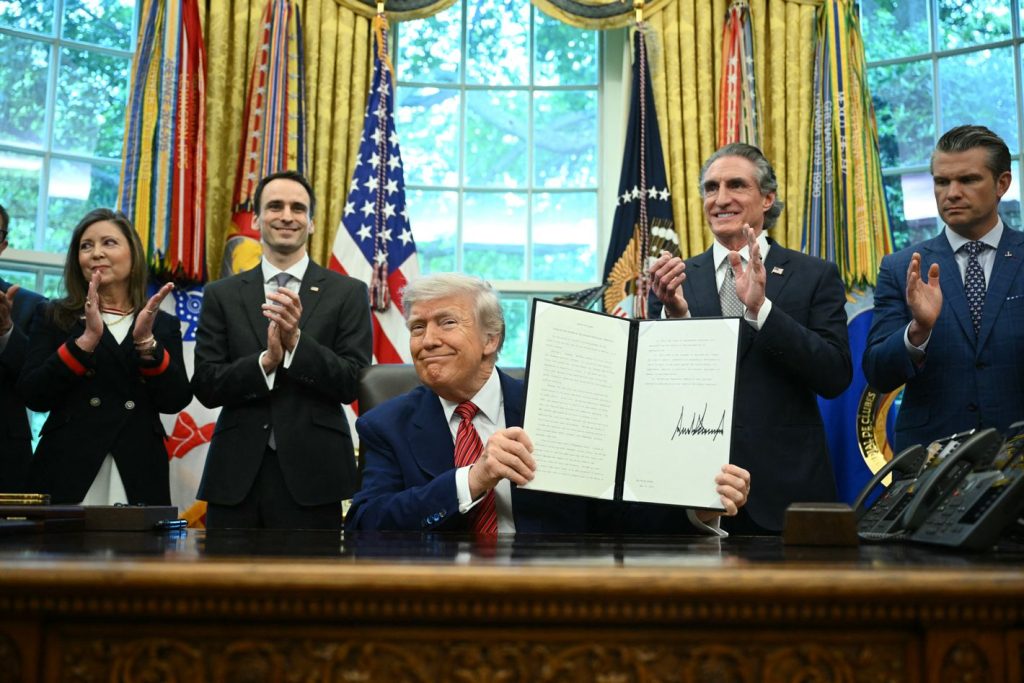Photo: Mandel Ngan/AFP/Getty Images
With all the chaos that has pervaded the federal bureaucracy in Trump’s second term, some very basic MAGA “reforms” may have escaped attention. The best known is the reimposition of the so-called Schedule F, an initiative adopted late in the first Trump administration (and promptly revoked by Joe Biden) that reclassified around 50,000 civil service positions into political appointments. But as Don Moynihan explains, that initiative just makes it easier to fire “deep state” bureaucrats who haven’t bent the knee to the new regime. A broader hiring initiative has just been announced by the Office of Personnel Management, which is basically the federal government’s HR agency. Called the Merit Hiring Plan (reflecting the wording of the Trump executive order that mandated it), the initiative has many interlocking provisions aimed at simplifying and, well, politicizing federal hiring practices, partly to kill, bury, exhume, and kill again anything that looks like DEI policies, but also to build a spanking-new federal workforce composed of “patriotic,” hardworking proles.
What leaps right off the page and punches you in the mouth is the initiative’s new rules for federal job applications. All applicants for jobs graded at GS-5 or higher (or roughly 94 percent of federal jobs) will have to answer (in less than 200 words each) four essay questions. Two are pretty banal, involving testaments to applicants’ work ethic and examples of efficiencies they’ve achieved in prior jobs. A third raises some eyebrows:
How has your commitment to the Constitution and the founding principles of the United States inspired you to pursue this role within the Federal government? Provide a concrete example from professional, academic, or personal experience.
This is pretty rich coming from an administration whose leader has suggested he may not have to uphold the Constitution in his own job (notwithstanding that it was right there in his oath of office). In addition, the “founding principles of the United States” is a fairly subjective notion. But there’s a fourth essay question that takes the cake:
How would you help advance the President’s Executive Orders and policy priorities in this role? Identify one or two relevant Executive Orders or policy initiatives that are significant to you, and explain how you would help implement them if hired.
Now keep in mind that Trump’s EOs include such matters as the demonization of law firms and individuals who have crossed Donald Trump in the past. Would it be kosher for someone applying for a GS-6 gig to write a few sentences about how she or he will help implement Executive Order 14246, “Addressing Risks for Jenner and Block”? Expanding the scope of essays into presidential “policy priorities” adds an element of rather extreme subjectivity into the process. Do Trump “policy priorities” include items like his frequently repeated insistence that federal judges (particularly those he appointed) owe him 100 percent loyalty, or that Canada should become the 51st state? Do they extend to the policy priorities of his Cabinet members, like Robert F. Kennedy Jr.’s MAHA anti-vaccine and anti-fluoride initiatives?
While much is unclear about this question, what’s unmistakable is that all federal job applicants are essentially being instructed to demonstrate their personal commitment to Trump and his erratic if very loud worldview. This isn’t just a hortatory gesture either; the OPM memo announcing the Merit Hiring Plan sets up monitored benchmarks for agency compliance beginning this month. As Moynihan notes, this is wildly unprecedented:
I cannot think of anything like this level of politicization being formally introduced into the hiring process. Under the George W. Bush administration, it was a scandal when appointees in the Justice Department were caught scanning candidate CVs for civil servant positions to try to discern their political leanings. Now they will just ask them to explain how they can serve President Trump’s agenda. Within the space of a generation, backdoor politicization practices went from being a source of shame to a formal policy.
Worse yet, if successful, it would guarantee massive turnover in the federal workforce the minute a Democrat — or even a Republican who isn’t a Trump mini-me — is elected president:
With this policy, any future President would know that some portion of their workforce was selected because they had expressed explicit support with their predecessor, and an agenda that the current President might disagree with. For all the Republican complaints about rooting out “the deep state” or “Democrat holdovers” the policy specifically encourages selection into permanent civil service based on political leanings that will invariably run contrary to future Presidents. They want to build their own deep state!
To put it another way, this Merit Hiring Plan institutionalizes a spoils system beyond the wildest dreams of the corrupt political bosses of the distant past. It deserves a lot of attention right now, if only to warn the poor schmoes who might want to apply for some lower-level federal job that they’d better bone up on their Trump EOs and get ready to pucker up and pledge allegiance.

